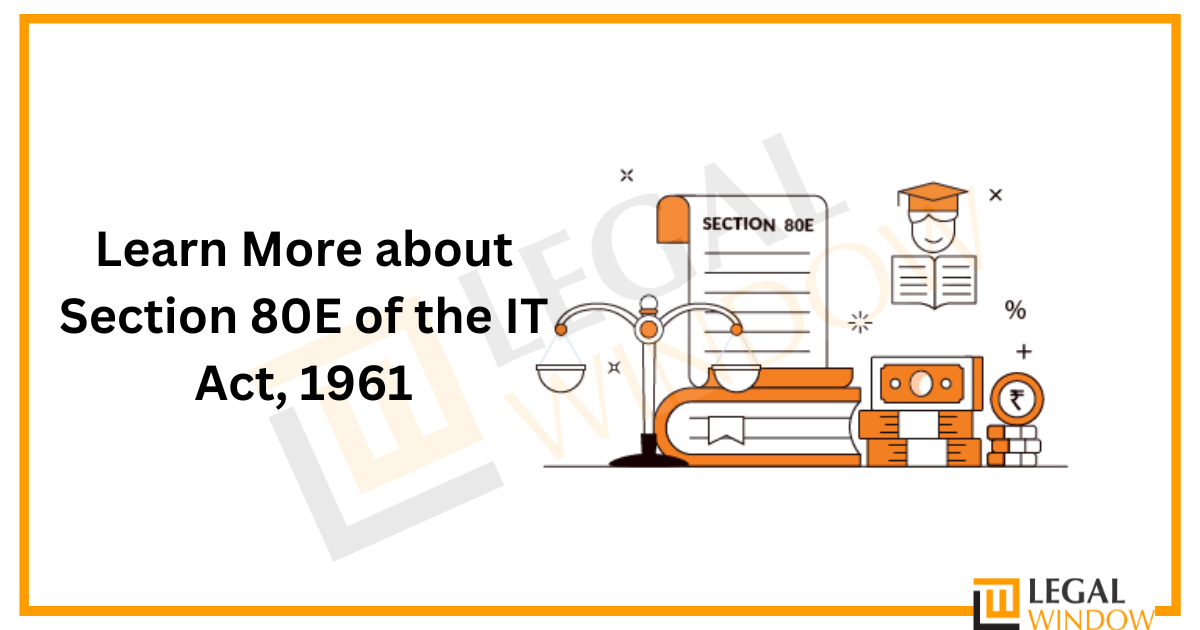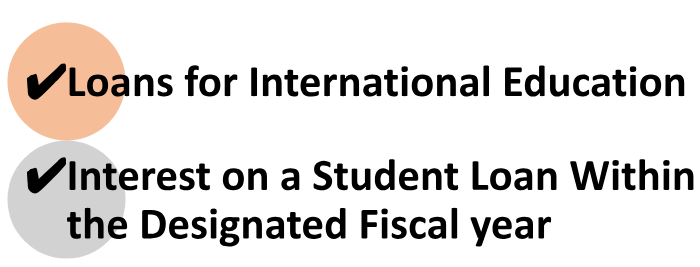
Our Indian economy and income levels are rising from day to day. At the same time, the expenses associated with education are also rising likewise. We have to know that if we spend money to pursue higher studies, we can save tax imposed from our income. To enable you to deduct the interest you pay on a student loan for higher education from your taxable income, section 80E of the Income Tax Act, 1961 was enacted.
Contents
Section 80E of the IT Act, 1961
One may claim a tax deduction for the interest paid on an education loan taken out to pursue higher education by Section 80E of the Income Tax Act, 1961. The total amount of interest from the EMI that you paid throughout a financial year is eligible for this tax deduction. It is said that a single person may make these deductions. There is no eligibility for corporations.
This tax deduction will be taken into account if the student borrowed money for their study from a bank or other financial organization. The taxpayer must present a bank or financier statement that clearly illustrates how the principal repayments and interest amount are split. The tax deductions are only mentioned for the student loans. It is a scheme of government put forward to encourage and help more students to pursue higher education in India.
How to Calculate Deduction Available Under Section 80E?
Under Section 80E of the Income Tax Act, 1961, interest on student loan principal is tax deductible. Furthermore, the only sum that can be removed is the interest paid on each EMI. The main amount being repaid is not deductible under section 80E. Furthermore, there is no available maximum deduction. Therefore, as long as the interest component and all other requirements are satisfied, you may claim any amount.
Illustration: One has an EMI of Rs. 3,00,000 set for a specific annual year. While the principal is only Rs. 1,30,000, the total interest is Rs. 1,70,000. The individual may deduct the whole Rs. 1,70,000 in interest payments for the fiscal year. Please be aware that he or she is not eligible to receive the Rs. 1,30,000 principal.
Finally, you must request a repayment certificate from the bank where you borrowed the money. The amount repaid as principal and interest separately during the financial year must be disclosed in this certificate. These certificates are simple to obtain and typically given by the bank automatically after the financial year’s repayment.
Eligibility Criteria for Section 80E
The requirements for claiming deductions under section 80E of the Income Tax Act are as follows:
- Anyone who lends money to pay for their higher education and is paying back the interest.
- Anyone who is covering the interest on student or education loans they have taken out for members of their immediate family.
Also, read: An Overview on Impact of GST on Loans
Investments Eligible Under Section 80E
Under Section 80E of the Income Tax Act, 1961, the investments on the list below are protected. When completing your income tax returns, you may deduct the following expenses:

Keep in mind that you must take out the loan to continue your education or career-related study. Under Section 80E of the Income Tax Act, 1961, loans that are not related to education are not eligible for tax deductions.
Conditions for Claiming Income Tax Deduction on Education Loan
- The individual should use the loan to pay for their higher education or the higher education of a family member. The family members are prescribed as a person’s spouse, children, guardian, etc.
- The loan must come from a recognized financial institution or philanthropic organization.
- A financial institution is a bank, per the Banking Regulation Act, 1949 (10 of 1949). It applies to all banks and other financial institutions covered by section 51 of that Act. This also holds for any other financial institutions that the Central government has informed in the Official Gazette.
- The person must first pay the EMI to claim the deduction. The income subject to tax must be used to pay the EMI.
- Higher education is any field of study undertaken after passing the Senior Secondary Examination or a program of study with a similar level of difficulty from any college or university. Any other authority designated to do so by the Central Government State Government or Local Authority, as well as any other government entity, must recognize such an education.
- For purposes of section 80E, an approved charitable institution is mentioned in clause (a) of sub-section (2) of section 80G or one that is specified in, or, as the case may be, an institution established for charitable purposes and approved by the prescribed authority under clause (23C) of section 10.
Section 80E Deductions and Limits
The list of tax deductions and their exclusions of education loans under section 80E of the IT Act, 1961 is as follows:
- The deduction of tax is available for education loan interest payments made during a particular annual year.
- No limitations are on tax deductions for student loan interest payments, but the benefits are only available up to eight years from the start of loan repayment.
- The interest paid after the first eight years can only be deducted from taxes.
- Tax deductions are only allowed for student loan interest payments; the principal amount is not included.
Closing Remark
Both parents and children may claim a deduction under Section 80E of the Income Tax Act, 1961. This indicates that either the parent or the child who repays the student loan may make use of the deductions allowed by this section. Don’t let your concerns about money prevent you from having huge dreams!
In case of any query regarding Section 24 of the Income Tax Act, 1961, feel free to connect with our legal experts at Legal Window at 72407-51000.
CA Pulkit Goyal, is a fellow member of the Institute of Chartered Accountants of India (ICAI) having 10 years of experience in the profession of Chartered Accountancy and thorough understanding of the corporate as well as non-corporate entities taxation system. His core area of practice is foreign company taxation which has given him an edge in analytical thinking & executing assignments with a unique perspective. He has worked as a consultant with professionally managed corporates. He has experience of writing in different areas and keep at pace with the latest changes and analyze the different implications of various provisions of the act.
Categories
- Agreement Drafting (23)
- Annual Compliance (11)
- Change in Business (36)
- Company Law (148)
- Compliance (90)
- Digital Banking (3)
- Drug License (3)
- FEMA (17)
- Finance Company (42)
- Foreign Taxation (6)
- FSSAI License/Registration (14)
- GST (118)
- Hallmark Registration (1)
- Income Tax (200)
- Latest News (34)
- Miscellaneous (164)
- NBFC Registration (8)
- NGO (14)
- SEBI Registration (6)
- Section 8 Company (7)
- Start and manage a business (21)
- Startup/ Registration (129)
- Trademark Registration/IPR (40)
Recent Posts
- Registration of Charges with ROC May 1, 2024
- Post incorporation compliances for companies in India April 30, 2024
- Startup’s Guide to Employee Stock Ownership Plans April 29, 2024
About us
LegalWindow.in is a professional technology driven platform of multidisciplined experts like CA/CS/Lawyers spanning with an aim to provide concrete solution to individuals, start-ups and other business organisation by maximising their growth at an affordable cost.









